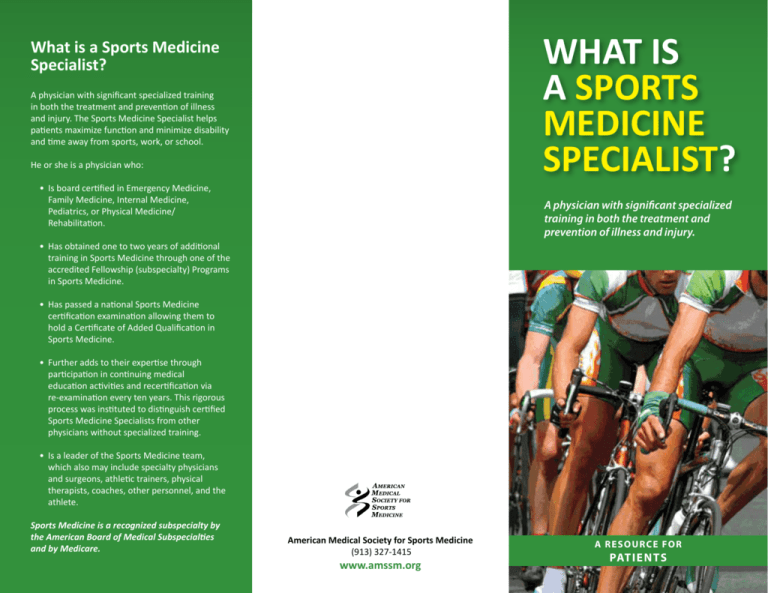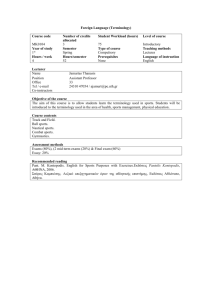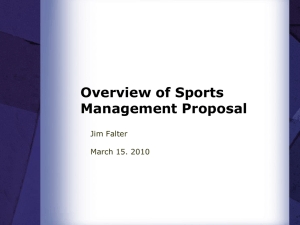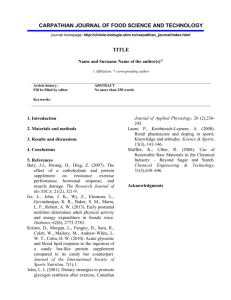what is a sports medicine specialist?
advertisement

WHAT IS A SPORTS MEDICINE SPECIALIST? What is a Sports Medicine Specialist? A physician with significant specialized training in both the treatment and prevention of illness and injury. The Sports Medicine Specialist helps patients maximize function and minimize disability and time away from sports, work, or school. He or she is a physician who: • Is board certified in Emergency Medicine, Family Medicine, Internal Medicine, Pediatrics, or Physical Medicine/ Rehabilitation. A physician with significant specialized training in both the treatment and prevention of illness and injury. • Has obtained one to two years of additional training in Sports Medicine through one of the accredited Fellowship (subspecialty) Programs in Sports Medicine. • Has passed a national Sports Medicine certification examination allowing them to hold a Certificate of Added Qualification in Sports Medicine. • Further adds to their expertise through participation in continuing medical education activities and recertification via re-examination every ten years. This rigorous process was instituted to distinguish certified Sports Medicine Specialists from other physicians without specialized training. • Is a leader of the Sports Medicine team, which also may include specialty physicians and surgeons, athletic trainers, physical therapists, coaches, other personnel, and the athlete. Sports Medicine is a recognized subspecialty by the American Board of Medical Subspecialties and by Medicare. American Medical Society for Sports Medicine (913) 327-1415 www.amssm.org A RESOURCE FOR PATI EN TS Sports Medicine Specialists are uniquely positioned to meet the demands of today’s health care environment. What is the difference between a Sports Medicine Specialist and an Orthopedic Surgeon? Both are well trained in musculoskeletal medicine. Sports Medicine Specialists specialize in the non-operative treatment of musculoskeletal conditions. Orthopedic surgeons are also trained in the operative treatment of these conditions. However, approximately 90% of all sports injuries are non-surgical. The Sports Medicine Specialist can maximize non-operative treatment, guide appropriate referrals to physical and occupational therapies, and if necessary expedite referral to an orthopedic/sports surgeon. Common examples of musculoskeletal problems include: • Acute injuries (such as ankle sprains, muscle strains, knee & shoulder injuries, and fractures) • Overuse injuries (such as rotator cuff and other forms of tendonitis, stress fractures) • Medical and injection therapies for osteoarthritis Sports Medicine Specialists have received additional training in the non-musculoskeletal aspects of sports medicine. Common examples of these include: • Concussion (mild traumatic brain injury) and other head injuries • Athletes with chronic or acute illness (such as infectious mononucleosis, asthma or diabetes) • Nutrition, supplements, ergogenic aids, and performance issues • Exercise prescription for patients who want to increase their fitness • Injury prevention • “Return to play” decisions in the sick or injured athlete • Recommendations on safe strength training and conditioning exercises • Healthy lifestyle promotion Typical Years of Training for Sports Medicine Specialists: Undergraduate...............................4 years Medical School...............................4 years (MD/DO) Residency.......................................3 years Fellowship . ....................................1-2 years TOTAL.............................................12-13 years training Typical Medical School/Residency/Fellowship Hours: Lecture Hours (pre-clinical.............2,700 Study Hours (pre-clinical)...............3,000 Residency Hours ............................9,000-10,000 Fellowship Hours............................2,500-7,500 TOTAL.............................................17,200-23,200 hours To find a Sports Medicine Specialist in your area visit http://www.amssm.org/Find-a-Doc.html. Most Sports Medicine Specialists also serve as Team Physicians for local and/or national teams and clubs. These physicians must fulfill published qualifications with the following responsibilities: • Pre-participation physical examination • Injury assessment and management • Care of sports-related and general medical needs of athletes • Special populations (geriatric, disabled, women, youth, etc.) • Sports psychology issues • Substance use issues • Education and counseling on illness & injury prevention • Coordinating care with other members of the sports medicine team to include athletic trainers, physical therapists, personal physicians, other medical and surgical specialties, and other ancillary personnel of specialty care and rehabilitation • Communication with athletic trainers, coaches, school administration, as well as athletes and their families Do Sports Medicine Specialists only treat competitive athletes? No, Sports Medicine Specialists are ideal physicians for the non-athlete as well, and are excellent resources for the individual who wishes to become active or begin an exercise program. For the “weekend warrior” or “industrial athlete” who experiences an injury, the same expertise used for the competitive athlete can be applied to return the individual as quickly as possible to full function. Physicians in the AMSSM are dedicated to providing comprehensive and quality care to the active individual.





